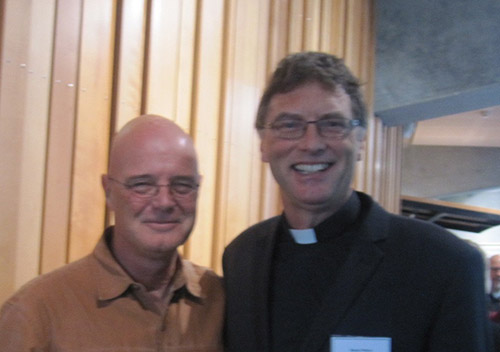This is not a book review – mainly because I do not have the book (yet), so I haven’t read it!
Last week I was at a conference at which Brian McLaren was the keynote speaker. I had met Brian on a previous visit of his, and I was delighted to meet up with him again. Certainly, I will read his latest book, Why Did Jesus, Moses, the Buddha, and Mohammed Cross the Road?: Christian Identity in a Multi-Faith World. Reflection around that book was the focus of his talks.
I want to just highlight (and in my own words – so I hope I’m not putting words into his mouth) what I thought was central to his material, and echoes my own approach.
On the one hand there are those whose passionate convictions lead them to denigrate other perspectives. I am right – therefore you are wrong. It is an exclusivist position which in Brian’s talks focuses on the rightness of the Christian faith thereby giving little space to the perspective of those of other faiths. The model can also, of course, apply to any number of current hot topics.
The other, opposite approach, is to be so lukewarm about one’s own position, to water down one’s own beliefs – and, at the same time, those who appear to differ from you, that, it is hoped, the resulting ubiquitous greyness will have everyone getting along.
A third approach, more my approach, and, if I understand Brian correctly, more his approach, is to have the inclusivity and the openness result from a passionate commitment to one’s own beliefs. Because I believe in Jesus and the Bible and so forth THEREFORE we are open, inclusive, listening to differing perspectives, etc. Not in spite of…
Very often the open, listening, inclusive position is presented “over against” a solidly “biblical” approach. This different approach is saying the solidly biblical approach impels us to openness and inclusivity. There is regularly a contrast between solid biblical teaching and the complexity of pastoral situations that this “black and white” biblical teaching must be lived in, with some stressing the “biblical” and some the “pastoral”. This third approach does not fall into this dichotomy, this dualism, but sees the good pastoral response as intrinsic in a good understanding of the biblical.
What do you think?
If you appreciated this post, consider liking the liturgy facebook page, and/or signing up for a not-very-often email, …





I look forward to finding and reading this book. Only last week I was very troubled by a young preacher who claimed that all those who don’t believe in Jesus Christ will discover – eventually – that they are God’s enemies. I saw a few listeners exchanging uncomfortable glances and there was very little discussion at the end. It did not sit well with us. It is good to hear of someone offering a Biblical basis to inclusivity. It is one of the reasons I enjoyed the work of the late Marcus Borg so much.
Thanks, Gillian. The words of the young preacher can be self-undoing: those who don’t believe in Jesus who breaks down the barriers that divide may certainly find themselves at enmity with the God who includes.
In the words of Edwin Markham:
Blessings.
I can see the last argument makes it “nice” for others but I gather the Kingdom of God has some entry requirements that we simply cannot meet ourselves. At some point being “nice” doesn’t cut it and may lead to a false sense of security so the error must be challenged at some point. The great revival calls ring in my ears, “What must I do to be saved?”.
I don’t know where you are finding your “nice”, Brown, in what you call the last argument. You are right, all of us cannot meet the requirements ourselves – that in itself means there are no “others”. Blessings.
Yes Brian was in Auckland recently. I remember several years ago reading McLaren’s book A Generous Orthodoxy and thoroughly enjoyed it. In that book McLaren presented old ideas in new ways. ++ Rowan Williams did something similar with the Apostles Creed. As an “emergent” advocate McLaren highlights a lot of the values he has found in other traditions and calls for them to be a part of the church of tomorrow. This is something I support. However, at one point he mentions that the substitutionary atonement was not in the original creeds and seems to infer that perhaps shouldn’t be among our fundamentals. Many others, including myself, see this as one of the very foundations of Christian belief and how one can practice the presence of God (which he calls us to) without experiencing this truth atonement puzzles me. Still Brian McLaren is a gifted and erudite thinker.
Thanks, Rob. I wonder if you might give the actual quote and context of Brian’s comment. I would be surprised if he explicitly denies the doctrine of the atonement. I would not at all be surprised if he critiques versions of the popular model/explanation/theory of how this works, usually called “penal substitution”. Whilst holding to the doctrine of atonement, I am also critical of the way that the penal substitution theory is regularly presented. Blessings.
Kia ora Bosco,
No i don’t have the actual quote from the book A Generous Orthodoxy. In fact i don’t even have the book any more as i had given it away. I will search this out and get back to you.